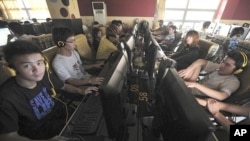Chinese leaders are announcing new plans to strengthen controls over the Internet and other social media, following a year where such technologies have played a key role in channeling public discontent, around the world. But the Internet’s rapid growth in China and the quick adoption of new technologies by political activists are challenging state efforts at control.
Crackdown
Chen Guangcheng is a blind lawyer who was imprisoned in 2006 after he accused local family planning officials of forcing women to undergo abortion and sterilization. He was released in 2010, but has been under house arrest since then. Recent reports from media and human rights groups say he has been brutally beaten.
People from around China have shared information about Chen's case on online microblogging sites and have been going to his village to show their support.
One supporter, Mao Hengfeng, 50, from Shanghai was among a group of more than 30 people who say they were beaten when they went to Chen's village this week.
She says she does not use the Internet because her health is poor, and that she cannot even send messages on her mobile phone. But in an acknowledgement of the Web's growing importance, she says she has savvy friends who help her with the Internet.
More people online
Chinese officials say some 400 million people are now online in the country, the most in the world. Although online forums allow information to travel much more broadly than was possible, even a few years ago, analysts say the Internet is having an impact on what issues are discussed and debated within Chinese society.
David Bandurski, with Hong Kong University’s China Media Project, points to the “Free Chen Guangcheng” campaign as a turning point in Chinese activism.
“Recently and still, the Chen Guangcheng case, the blind lawyer in Shandong province, who has been an international case in Chinese human rights for years now, has finally become a domestic issue," Bandurski said. "Ordinary Chinese are very concerned about the Chen Guangcheng case and various aspects of it.”
Instant access
Bandurski says what has changed from the past is that microblog services are dispersed and that posted information is transferred instantly, in a matter of seconds, across the country.
Bandurski stresses these users are able to communicate with the added power of images - either video or photos - which also are transmitted immediately through cyberspace.
“The Internet has been able to take some stories and push them into the national spotlight and also often drive mainstream media coverage, but this has been happening at a much faster pace now, with social media,” he said.
New disruptions
Chinese authorities have already shown themselves to be concerned about the link between instant communication and mass protest. There were significant Internet and cell phone disruptions in Tibet in 2008 and in Xinjiang in 2009, following violent demonstrations in those two restive minority regions.
To keep up with all of the people online, the Chinese government employs tens of thousands of censors to remove offending material as quickly as possible. There are also people paid to write positive online spin. They are called “soldiers in the 50-cent army,” which is the amount a person is allegedly paid for each pro-government comment he or she posts.
In August, Tang Jun, the Communist Party secretary of the northeastern city of Dalian, stood on top of a van and pleaded with tens of thousands of demonstrators to disperse.
They were there to protest a chemical plant that produced paraxylene, a toxic chemical widely used in plastic bottles and polyester clothing.
The demonstration was largely organized by microblogging and social networks. Cell phone photos of the event circulated online, making the Dalian events instantly known around the world.
Earlier this year, Chinese authorities reacted with a heavy show of security following anonymous online calls for people in cities around the country to demonstrate in sympathy with the Jasmine protests in the Middle East.
Economic impact
Chinese Foreign Ministry spokeswoman Jiang Yu was recently asked about Internet censorship, in the context that it is also an economic issue because many foreign businesses also are victims of the Chinese government's online blocks.
Jiang says China administers the Internet according to the law because it wants to safeguard public interest and promote sound Internet development.
China's top leaders are moving to intensify controls of online social media and instant messaging tools to promote what has been described as the “orderly dissemination of information.”
The broad policy announcement was included in a communique from the Chinese Communist Party's Central Committee, which held its annual meeting in October.
China to Tighten Controls on Internet, Social Media
- By Stephanie Ho

Move meant to thwart political activists use of new technologies to express public discontent



